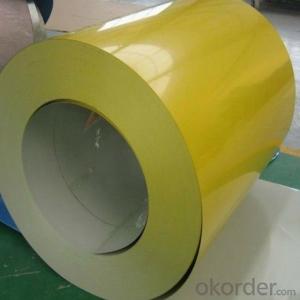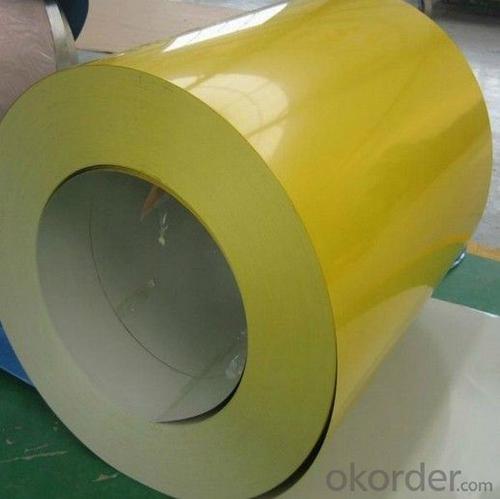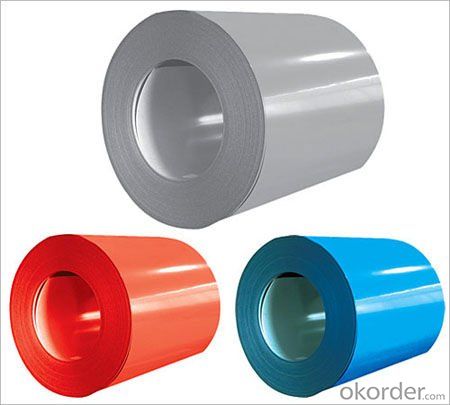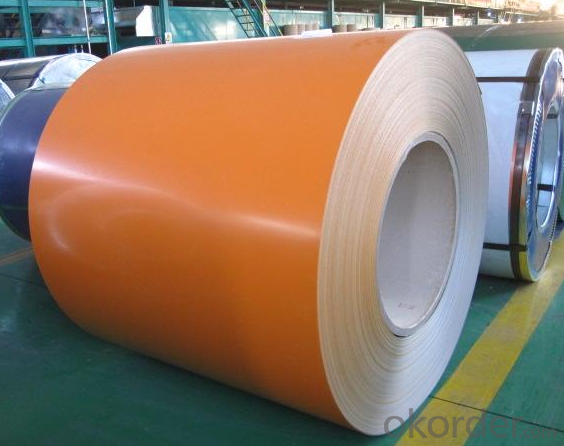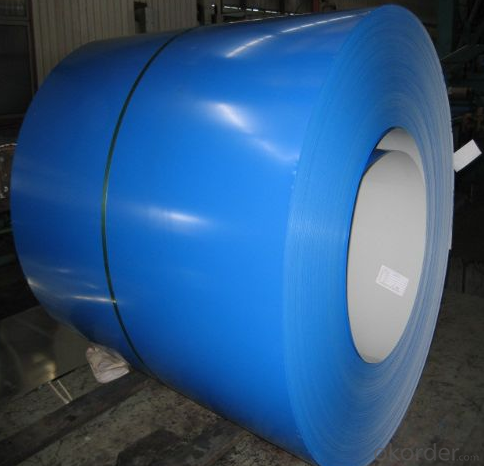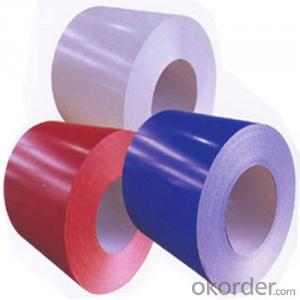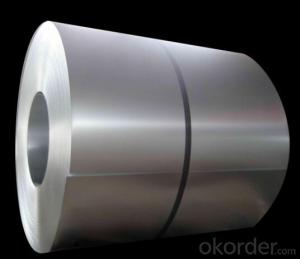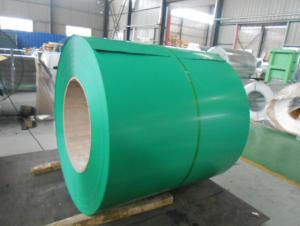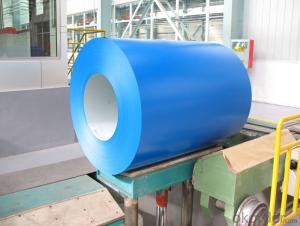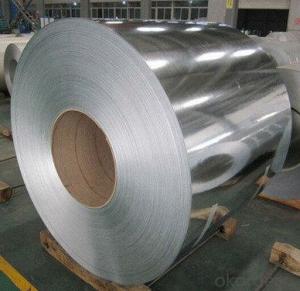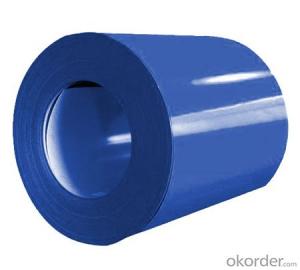Prepainted Galvanized Steel Coils, SGCC,DX51D
- Loading Port:
- China main port
- Payment Terms:
- TT OR LC
- Min Order Qty:
- 25 m.t.
- Supply Capability:
- 100000 m.t./month
OKorder Service Pledge
OKorder Financial Service
You Might Also Like
1) AVAILABLE DESIGNATION OF (Prepainted galvanized steel coils) printed PPGI coils
Quality Q/BQB 440-2003 JIS G3312-1994 EN 10326-2004 ASTM A653-02a
EN 10327-2004 (BASE PLATE)
(BASE PLATE)
Commercial Steel TDC51D CGCC DX51D+Z/AZ CS Type A/B/C
Forming Steel (TSt01,TSt02,TSt03) CGCD1 FS Type A, Type B
Drawing TDC52D /TDC53D - DX52D+Z/AZ DDS TYPE A/C
Steel DX53D+Z/AZ
Structural TS280GD(TStE28) CGC400 S280D+Z/AZ SS275
Steel TS350GD(TStE34) CGC440 S350D+Z/AZ SS340 Class1
2) OUR SPECIFICATION OF (Prepainted galvanized steel coils) printed PPGI coils
Available Size:
Manufacturer Thickness Width Length of plate Inner diameter of coil
JIANGSU HUIYE STEEL SHEET CO.,LTD 0.2-1.2mm 800/914/1000/1200/1219/1250mm 1000-6000mm 508mm/610mm
Coated Mass OF (Prepainted galvanized steel coils) printed PPGI coils:
Base plate Available Coated Mass(g/m^2)
Galvanized Steel 80, 100, 120, 160, 180
Galvalume Steel 50, 70, 150
Available Painting OF (Prepainted galvanized steel coils) printed PPGI coils:
Category of Painting Item Code
Polyester PE
High-durability polyester HDP
Silicon modified polyesters SMP
Polyvinylidene fluoride PVDF
Easy-Cleaning —
Painting Thickness Top side: 20+5microns;
Bottom side: 5~7microns.
Color System Produce according to RAL Color System or as per buyer’s color sample.
Painting structure Top surface Bottom surface
Primer coating No coating 1/0
Primer coating Primer coating 1/1
Primer coating + Finish coating No coating 2/0
Primer coating + Finish coating Primer coating or single back coating 2/1
Primer coating + Finish coating Primer coating + Finish back coating 2/2
- Q: How are steel coils inspected for mechanical properties?
- Steel coils are inspected for mechanical properties through a series of tests and measurements. These include hardness testing, tensile testing, and elongation testing to determine the steel's strength, ductility, and overall quality. Additionally, non-destructive testing methods like ultrasonic testing and magnetic particle inspection are used to detect any potential defects or flaws in the coils. Overall, a combination of these inspection techniques ensures that steel coils meet the required mechanical properties for their intended applications.
- Q: How do steel coils contribute to the construction industry?
- Steel coils play a crucial role in the construction industry by serving as the primary raw material for a wide range of applications. These coils are used in the construction of buildings, bridges, highways, and other infrastructure projects. They are used to manufacture various structural components, including beams, columns, and trusses, providing strength, durability, and stability to the structures. Steel coils also contribute to the industry by enabling the fabrication of roofing and siding materials, reinforcing bars, and other construction elements. Their versatility, high strength-to-weight ratio, and resistance to corrosion make steel coils an essential resource for the construction industry.
- Q: What are the quality standards for steel coil manufacturing?
- The quality standards for steel coil manufacturing include factors such as the grade and composition of the steel, dimensional accuracy, surface finish, mechanical properties, and adherence to industry-specific standards and specifications. These standards ensure that the steel coils meet the required strength, durability, and performance criteria for various applications such as construction, automotive, and manufacturing.
- Q: I'm looking for a steel plate for an design project that requires neodymium magnets to be stuck on them. I am trying to figure out what kind of steel plate would have hold the magnets up the best.
- 1) Not to be mean or anything but Steel is an alloy. Anything metal or of metallic nature is an alloy. 2) Iron although not very strong attracts magnets the best.
- Q: What is the average price of a steel coil?
- The average price of a steel coil can vary depending on several factors such as the type of steel, the thickness and width of the coil, the market demand, and the location of purchase. Generally, the price can range from $500 to $1500 per metric ton. However, it is important to note that prices are subject to fluctuations in the steel market, which can be influenced by global economic conditions, trade policies, and supply-demand dynamics. Therefore, it is advisable to consult with steel suppliers or monitor market trends to get the most accurate and up-to-date pricing information.
- Q: How long do steel coils typically last?
- The durability of steel coils is known to last for decades, as it is influenced by various factors including the quality of the steel, maintenance and care, as well as the specific application they are used for. The design of steel coils is generally focused on ensuring longevity by being resistant to corrosion. When properly cared for, regularly maintained, and used within recommended guidelines, steel coils can have a lifespan ranging from 20 to 50 years or more. However, external factors like exposure to harsh environments, extreme weather conditions, and the level of stress they endure can impact their longevity.
- Q: What is the role of steel coils in the production of pipes and tubes?
- Steel coils are essential in the production of pipes and tubes as they serve as the primary raw material. These coils are unwound and fed into a pipe or tube mill where they are shaped, welded, and formed into the desired dimensions. The high strength and durability of steel make it an ideal choice for manufacturing pipes and tubes, ensuring their structural integrity and ability to withstand various applications and environments.
- Q: How are steel coils inspected for defects?
- To ensure the quality of steel coils meets required standards, various methods are used to inspect them for defects. Visual inspection is a common method, where trained inspectors examine the coil's surface for visible defects like cracks, scratches, or dents. This can be done through direct observation or with the help of magnifying tools. Another method is magnetic particle inspection, which detects surface and near-surface defects like cracks or voids. Here, a magnetic field is applied to the coil, and magnetic powder is spread on the surface. If any defects are present, the powder will be drawn to them, making them visible to the inspector. Ultrasonic testing is also commonly employed to inspect steel coils for defects. It involves transmitting high-frequency sound waves into the coil and analyzing the reflected waves. Any deviations in the sound waves can indicate the presence of defects like cracks or voids within the coil. Eddy current testing is another method used to detect defects in steel coils. It works by using electromagnetic induction to generate eddy currents within the coil. Any changes in these currents caused by defects in the material are detected and analyzed by the inspector. Finally, in some cases, destructive testing is performed on steel coils. This involves taking a sample from the coil and subjecting it to tests such as tension or bend testing. These tests evaluate the mechanical properties of the steel and indirectly indicate the presence of defects. Overall, a combination of visual inspection, magnetic particle inspection, ultrasonic testing, eddy current testing, and potentially destructive testing is used to inspect steel coils for defects. These methods ensure that any defects are identified and addressed, guaranteeing the delivery of high-quality steel coils to customers.
- Q: So I want to get my 3+ wood shafted with a dynamic gold shaft because i need a stiffer shaft but dont want to spend much on it.I've never swung a steel shafted wood, but I hear that it is more consistent that graphite....Plus, since the cost of steel is only $15 compared to the $65 graphite, not to mention installation charges.So yeah...... How good is steel for fairway woods?BTW, my swing speed is about 95 but i can amp it up to 110 (with control, that is)
- There are very few people who hit steel shafted fairway woods. Tiger Woods used to have a steel shafted 3 wood but went to graphite because it didn't feel right because of his driver. Go get custom fit for a shaft and see if a steel shaft is good to make sure because you don't want to turn aroung a get a graphite shaft anyway if the steel shaft doesn't work. Go with whatg works the first time so you don't put out more money later.
- Q: Are steel coils used in the oil and gas industry?
- Yes, steel coils are commonly used in the oil and gas industry for various applications such as pipeline construction, storage tanks, and drilling equipment. The strength, durability, and corrosion resistance of steel make it an ideal material for handling the demanding conditions in this industry.
Send your message to us
Prepainted Galvanized Steel Coils, SGCC,DX51D
- Loading Port:
- China main port
- Payment Terms:
- TT OR LC
- Min Order Qty:
- 25 m.t.
- Supply Capability:
- 100000 m.t./month
OKorder Service Pledge
OKorder Financial Service
Similar products
Hot products
Hot Searches
Related keywords
